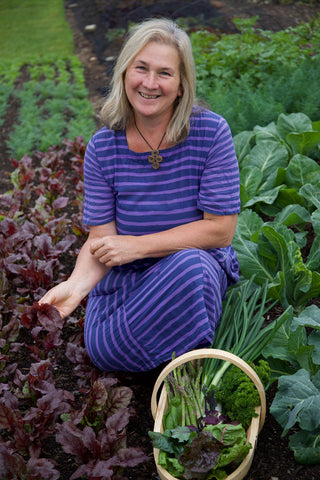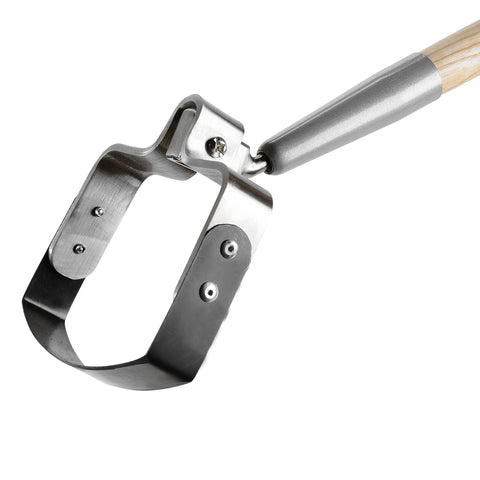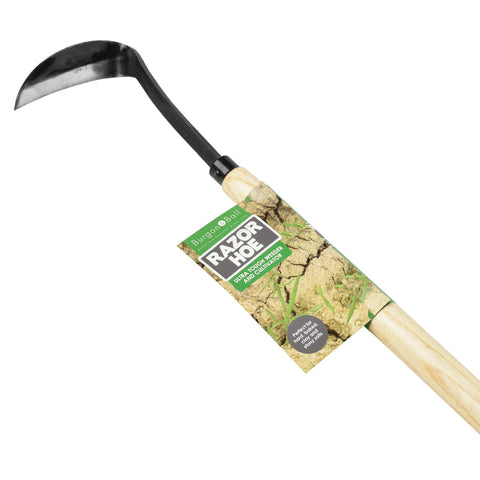
THIS GIVEAWAY HAS NOW CLOSED
The gardens have been dismantled, the dust has settled, the glorious spectacle of the RHS Hampton Court Garden Festival is just a memory. What better time to sit down and have a chat with Stephanie Hafferty, one of the designers of the show’s RHS No-Dig Allotment Demonstration Garden, as she looks back at the monumental task of creating one of the high-profile feature gardens?
And as if Steph’s behind-the-scenes reflections on the garden aren’t enough, we have a great giveaway for you, too! We have a copy of Steph’s book The Creative Kitchen to give away, packed with creative ideas for cooking seasonally and making organic products for you and your family's health and happiness. What’s more, we’ll add in a couple of the tools which were used and featured in Steph’s Hampton Court garden – more details below.
Stephanie, many congratulations to you, your co-designer Charles Dowding and the whole team behind the Hampton Court garden, it looked fantastic and seemed to be a real crowd-puller at the show. Was it your first RHS show garden?
Thank you. Yes, we were all thrilled with the response. There were many thousands of visitors to the garden every day, it was a wonderful experience.
The team who built the garden - Jon Wheatley (Stonebarn Landscapes) and Terry Porter (who grew most of the plants) - have been creating RHS show gardens for many years, but this was the first one that Charles or myself have designed.
Sara Venn, who worked with me every day during the show itself, has worked on several RHS gardens too, including show gardens for Chelsea, so she was a great asset. Jan Wilmot was also there every day, the three of us were the first to arrive and the last to leave each day (the garden took a lot of setting up and closing down each day), and we had other helpers too, including some amazing speakers. We had a team of experienced gardeners on the plot every day, answering questions, quite unusual for a show garden.

Can you tell us a bit about the design process? Were you given a wish-list of elements to include, or did you have a fairly free rein?
We were asked to design the garden in 2019, for the show in July 2020 which was of course cancelled due to the pandemic. The RHS wanted it to be about no dig of course, and growing your own on allotments, but other than that we were given a lot of freedom with the design.
Charles and I combined our experiences of no dig gardening: both of us have a lot of experience growing in market gardens (Charles 40 years, me 13 years) and I have also grown in home gardens and allotments for over 30 years.
We worked out what we wanted to include: no dig beds, a polytunnel, greenhouse, composting, water harvesting, fruit trees, intercropping, etc and came up with the original design. This was discussed with our then project manager Chris Smith (of Pennard Plants, he sadly had to pull out in March 2021) who made sure the design would work for a show garden, allowing proper access for everyone.
In the spring of 2021, the design was updated with Jon Wheatley and Terry Porter’s help to include social distancing measures and a one way system. They stepped in just a few weeks before the show opened and really saved the day - the garden couldn’t have happened without their expertise, experience and plants!

The construction team and myself arrived on site on June 21st for the build (Charles arrived after the garden was made on Press Day.) The first thing Tom and the team from Stonebarn landscapes constructed was the wooden gazebo - a place to eat lunch during the two week construction and, during the show, somewhere for us all to shelter from the weather!
During the build some aspects of the design changed a little - for logistical reasons the polytunnel was a bit smaller than planned, and the team designed some fantastic water harvesting structures using antique metal barrels and chains - effective and eye-catching. I created a wildlife area using items foraged from all of the other gardens’ skips and suggested the pallet compost heap “grow walls”. I usually make these using old compost sacks as liners, but the construction team suggested using timber which made much more substantial growing troughs. The design evolved during the build, just like a real garden does!

Where was all that luscious-looking produce grown? Was it grown and transported in pots?
The plants were mostly grown by Terry Porter, some by Jon Wheatley. All of them were grown in pots, it’s a remarkable skill to be able to grow mature vegetable plants this way! Terry grows the plants in a large structure completely covered with mesh which prevents pests from entering. This enables him to grow perfect show quality vegetables without any pesticides.
[You can see some photos of Terry growing the produce for the garden, as well as read more about the build process, on Steph's blog here. - B&B]
How was it having TV crews tramping through the garden? And Carol Kirkwood presenting the BBC Breakfast weather from your compost bin?
It was great fun! I’ve never had the weather reported from my compost bin before! Mark Lane filmed some footage for his morning TV programme, Adam Jones and the team from Heno at S4C filmed a programme entirely in Welsh, and of course Arit Anderson filmed Charles and myself for the BBC. It’s amazing how much footage is taken for a fairly short feature on a TV programme, and fascinating for us all to participate in and watch.


Over the week you must have talked to thousands of people. Were there any myths or misconceptions about No Dig that you kept hearing, which you’d like to correct?
It was at least 10,000 people every day - oh my! The biggest misconception about the garden was that it was just Charles’ creation. It was co-designed by us both, along with Stonebarn Landscapes and Terry Porter - and I did most of the project managing during the 18+ months from conception to creation - a real team effort.
People are often confused about how one plants trees, shrubs and other larger plants in no dig beds, there is a misconception that you can’t dig a hole for root balls. In reality you plant trees in the usual manner - no dig is about not turning the soil over annually.
There’s also the misunderstanding that you need a lot of compost every year to grow no dig. The annual mulch is very little, a couple of centimetres if you have it, which is the same that one would need if digging too. It actually saves on compost because you can grow so much more in a smaller area.
Do you feel the last 18 months have created a new surge of interest in growing edibles in general, or in No Dig in particular?
Yes, there has been a significant interest in growing food and the increased awareness in the importance of protecting the soil flora and fauna for the future health of the planet has made many people realise the benefits of no dig gardening. We now know the importance of good gut health on our physical and mental health, and eating food grown organically in a soil rich with life is one way of ensuring a healthy gut biome. Not digging also locks carbon in the soil; something as simple as just not digging your veg plot can help reduce carbon in the atmosphere.
It’s a great way of growing a lot of delicious healthy food easily, and helping the planet.

Just a few months before the show, you also started a new no-dig garden in Wales. How is that going, and are you harvesting from it yet?
I moved here on March 17th and made the first no dig bed on March 31st. I’ve had a lot of harvests now considering it is only 5 months old - including potatoes, chard, beetroot, florence fennel, peas, beans, carrots, courgettes.
I’m very pleased with how it is all going, especially considering I was working away for over three weeks and all of the slugs moved in whilst I was gone - they ate most of my squash and winter brassicas. Setting up a new garden somewhere which hasn’t been cultivated is trickier in the first year. There are always more pests and I have had to learn about new ones too, including squirrels. I had no idea they ate so much.
As gardeners and growers, we’re always learning and looking for ways to improve. Was there anything new which you’ve taken away from your Hampton Court show garden experience?
At the show garden we had a side rail fitted to the polytunnel with a guttering attached, to harvest rainwater. I had my polytunnel installed here in August and this is something I will be making, such a simple and effective way to collect a lot of water.
o0o
Many thanks to Stephanie for generously sharing her time and expertise here. The RHS No Dig Allotment Demonstration Garden at the RHS Hampton Court Palace Garden Festival was created in association with Stephanie Hafferty and Charles Dowding; contractors were Stonebarn Landscapes and Terry Porter; supported by Dalefoot Composts, First Tunnels, Gardening Naturally and Burgon & Ball.
o0o

The giveaway
We have a copy of Steph’s book The Creative Kitchen to give away, packed with creative ideas for cooking seasonally and making organic products for you and your family's health and happiness. What’s more, we’ll add in a couple of the tools which were used and featured in Steph’s Hampton Court garden – our Express Hoe and our Japanese Razor Hoe. Both are ideal for no dig gardeners as they make it easy to keep on top of weeding, even in those hard-to-get-to corners. Together it's a bundle worth £78!
How to enter
THIS GIVEAWAY HAS NOW CLOSED
To win this delicious no-dig prize, all you need to do is leave a comment on this blog. Scroll to the bottom of this page to comment (your email address won't be published). You could tell us which edibles you like to grow, for example - or how long you've been no-dig gardening. You’ll also need to be a subscriber to our monthly email newsletter to be a winner, so if you're not already signed up, fill in your email address in the grey band right at the bottom of this page. You can unsubscribe at any time if you don’t enjoy our monthly updates.
The small print

Stephanie Hafferty no-dig prize draw, 2021
This giveaway is open to UK residents over the age of 18 only. No purchase necessary. No cash alternative is available. The winner will be chosen at random and the judges’ decision will be final. One winner will receive one (1) copy of The Creative Kitchen by Stephanie Hafferty; one (1) Burgon & Ball Express Hoe; and one (1) Burgon & Ball Japanese Razor Hoe. Prize draw opens at 00:01 on 27/08/2021 and closes at 23:59 on 09/09/2021. Winner will be contacted by Burgon & Ball shortly after the closing date. Employees of Burgon & Ball and their family members aren’t eligible to win. One entry per person; entries created by a bot or a service that automatically enters participants are not eligible to win. We draw your attention to our privacy policy here.




Having unknowingly grown cutting flowers by no dig for years I discovered it was not just me griwing this way during lock down. Having time to read up and learn, I turned my veg patch to no dig. I have had good results with the best potatoes and carrots ever. I love that so little work is needed to keep the patch full of lovely fresh veg all year. An occasional quick hoe keeps the weeds at bay and a good covering of compost is all I need to start the next season.
No dig has been amazing on our new allotment: the whole site was newly allotments and very weedy but the crops have been incredible. Love to see snd hear about the successes of no-dig gardens. Thanks for sharing Steph’s expertise.
Great interview. I’ve been practising nodig without really knowing it for some years and recently introduced it at the city farm where I am community gardener. It makes total sense!
When I started growing fruit and vegetables as a full time occupation, I realised that the no-dig approach was the obvious way to grow most successfully. I had trained with the RHS at Wisley and been introduced to no-dig there, and then when I needed it the online and published resources by Stephanie and others became my main source of guidance and inspiration. So thank you!
It’s great to see no-dig becoming more widely known about. We have had an allotment for about 30 years and it’s so much easier and more productive since we stopped digging 4 or 5 years ago. Knowing that it is also helping to store carbon in the soil is a real joy!